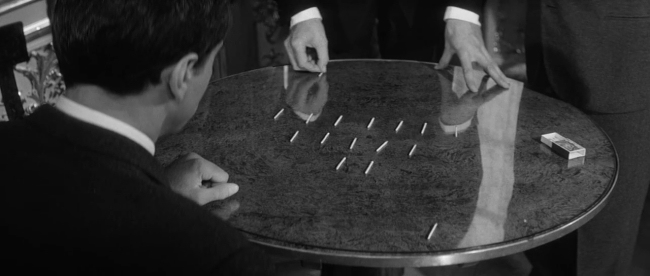
If perceptions create individual realities for each person, then what would it be like to separate interpretations from all individuals? 1961's Last Year In Marienbad (L'Année dernière à Marienbad) can be interpreted in a vast number of ways and this is quite deliberate of the filmmakers. Exhibiting an ornate, cold, artificial beauty, the movie conveys something of the fundamental Hell of uncertainty and isolation that exists thanks to the human capacity for abstract thought.
From the beginning, the film seems like a hybrid of cinema and poetry as the camera tracks slowly over gorgeous baroque interiors and a man in voice-over endlessly talks about how the corridors are endless and alike, the rooms are endless and alike, and people partake in the same conversations and casual actions endlessly.

The voice is at length revealed to be coming from one of a mostly motionless pair of performers on a small stage in front of a motionless crowd. When the curtain falls for the last time--after opening again twice for applause and bows the actors refrain from taking--the audience begins to chatter. Then they abruptly stop, freezing like a crowd of mannequins, then they start again, then stop again, then start again. Someone reminiscing to his neighbour about something that happened in, he thinks, 1928 or 1929, is oddly echoed later by someone else struggling to remember which of those years he's thinking of. The seemingly deliberate attempt to shine a spotlight on the artificiality of events resembles Jean-Luc Godard's films of the period but rather than the post-modernism of the New Wave, Last Year In Marienbad is more akin to the surrealism of Bunuel or Cocteau.

The idea here is not to reflect the inherent artificiality of film but the inherent artificiality of human thought and interaction. Despite most of the film being filled with idle party goers at the manor or hotel, it's really concerned only with three characters--a man (Giorgio Albertazzi), a woman (Delphine Seyrig), and a second man (Sacha Pitoeff). The voice-over we hear almost ceaselessly throughout the film belongs to the first man (henceforth I'll refer to him as "the man") as he appears to be trying to convince the woman that they've met before, that they were lovers, that he didn't rape her. She, meanwhile, seems mostly at ease and playful and continually denies ever having met him at all.

The second man is calm, mostly quiet and seems confidently possessed of some knowledge. He may be the woman's husband, he may be the Devil, he may be God, he may just be a butler. He invites the man to play Nim, a game involving the two of them lifting tooth picks off a table in turns, the loser being the one who's forced to take the final toothpick. People at the party speculate on the mathematical formula of how to win properly--it seems to be a game with an objective strategy and yet the second man seems to be unbeatable in a way that suggests psychological dominance. The man and the woman discuss their interpretation of the motives apparent in a statue of a man and woman. Later they interpret a painting before the second man interrupts them to describe how the scene unmistakably portrays an incident in the life of Charles III. As with the game, the sinister quality of the second man seems related to his ability to break in with harsh reality while the other two are trying to create dreams to their liking. Or the second man's use of objective fact may be in the effort to create a dominant unreality.

The urgent, organ soundtrack reminiscent of a horror movie, the sort of free fall feeling of the anxious narrators without any solid point of view on events resolving itself, the nagging inability to establish guilt or innocence, love or indifference, all convey the feeling of a purgatory or a house haunted by damned souls. The movie could equally be seen as from the man's perspective--as he feverishly tries to absolve himself of a crime, to prove to himself he was loved--and it can be seen as from the woman's perspective as she feverishly tries to absolve herself of any blame in taking part in an affair.

No comments:
Post a Comment